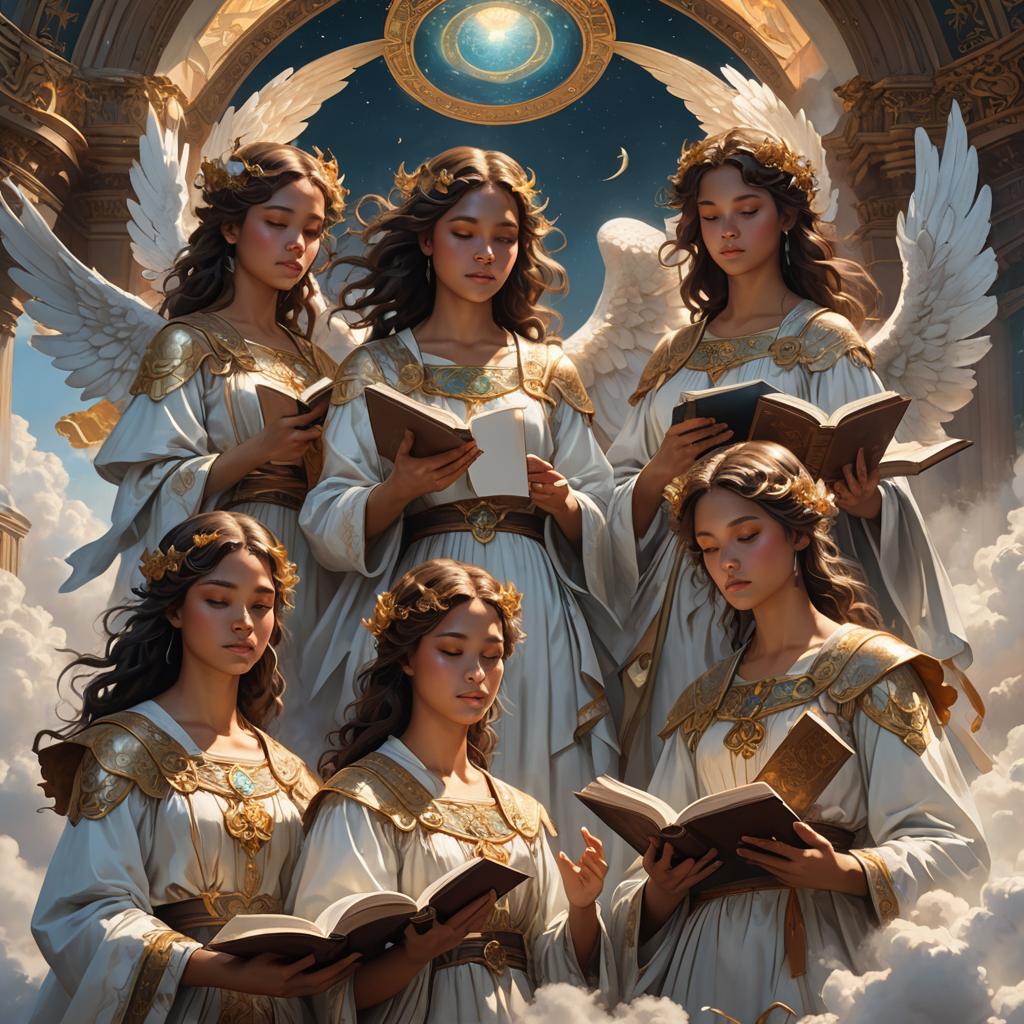Throughout history, angels have captivated our imaginations and sparked our curiosity. These celestial beings have been depicted as messengers, protectors, and beings of great power and beauty.
Early Angels
Angels are spiritual beings originating in Judaism, Christianity and Islam (and to a lesser degree Zoroastrianism). While their precise alignment, personality and duties vary across monotheistic Abrahamic faiths, all angels possess greater power than humans do and possess more knowledge. Furthermore, angels possess the ability to travel between physical and spiritual realities.
Noah Webster’s 1828 An American Dictionary of the English Language defined an angel as someone “who conveys messages from God or acts as His envoy”. The Bible contains accounts of angelic activity, such as Satan tempting Jesus. Additionally, angels feature prominently in ancient mythologies such as Greek gods and Indian pantheons.
Genesis 3:24 marks the first mention of cherubim in Scripture, where they can be seen among other winged creatures, specifically angelic winged ones such as seraphim, with wild humanoid features and wings. Cherubim were responsible for guarding entryway to Eden garden where Heaven and Earth met.
Christian doctrine considers angels spirits rather than physical beings, yet their forms vary according to rank and purpose. The highest-ranking angels in Christian theology are Seraphim. They are often depicted as guards for Yahweh’s holy throne that move around like bastions or sentinels encircling it with six wings.
Cherubim are among the best-known angels. Recognizable by their four faces pointing in all four cardinal directions and wings extending outward from their shoulders, these powerful guardians of worship sites serve as God’s protectors while “suppressing evil”, protecting truth, and leading people towards salvation.

Meaning
Angel is a term meaning “messenger.” Angels serve as God’s messengers and emissaries, carrying his messages directly to people while receiving requests from humans to deliver those same messages from them as well. Additionally, they serve as intermediaries between spiritual and physical realms. They do not possess physical limitations like we do, though when necessary they can take human forms, such as when an angel rolled back the stone on Jesus’ tomb!
Angels serve an important role in protecting and ministering to people, and the Bible offers numerous examples. Psalm 91 declares this fact by reminding us that God sends his angels to protect those who trust in Him, with physical guardian angels being especially beneficial if danger or illness threatens a believer’s wellbeing. Angels provide protection and aid both spiritually and materially for believers facing danger or illness.
Angels can provide comfort to believers and convey divine messages through dreams or visions, often appearing to offer guidance or wisdom. One key reason angelic appearances serve is to reveal Christ to humanity. Angels’ magnificence draws attention to his power while their presence helps motivate Christians towards worshiping him.
Angels serve another function, which is spiritual warfare against forces of evil. The Bible shows this in some instances, such as when one appeared to Daniel to interpret his dream. However, their full scope remains unknown as angels cannot be seen with human eyes.
Psalm 148:1-2 describes angels as servants who come before God to worship and praise Him, standing before Him to serve Him (Job 1:6, 2:1). Angels were once known by their biblical term bene ha-elohim (“children of the Most High”), although this name does not appear in the New Testament.

Function
Angels are invisible spirit beings created higher up on God’s order of creation than human beings. Sexless and deathless, angels exist solely to carry out God’s will, taking physical forms only when necessary for specific tasks.
As spiritual beings, angels communicate via telepathy with one another if there is sufficient mutual interest between them. Angels may also converse with humans if they agree to do so, though typically only with one individual at once.
Angels also serve a second function by aiding God with His work here on Earth, including sending messages from Him and carrying out judgments that He orders throughout history. Angels may be sent directly to specific locations to perform certain tasks or they can remain with Him on His throne, with lower orders often used to accomplish his purposes among humans and creatures alike on Earth.
Angels possess a profound knowledge of our world and its inhabitants, likely due to three factors. Angels were created higher than humans, so naturally have greater knowledge. Angels have studied the Bible extensively to gain an understanding of God’s viewpoint of different situations. Finally, angels have observed human activities for an extended period and thus know how people will react in various situations.
Angels provide guidance and encouragement when ministering to people. Examples of this can be seen when angels prompted Lot to leave Sodom, advised Hagar regarding her son, or comforted Elijah after his long fast. Angels also possess healing capabilities and can provide provision, though this rarely occurs.
Angels serve a crucial role in protecting God’s people. Angels were present when the Hebrews fled Egypt, killing Amalekites that attacked Joshua’s men, defending David and his family against Amalekite threats, and protecting Joshua when traveling through Persia and Syria. Additionally, apostles often traveled protected by angels when traveling.

Personality
Angels possess a gentle, loving, and sensitive disposition. They are willing to lend assistance whenever needed and always look for the good in people. These individuals have strong links to spiritual realms that enable them to channel messages from God directly to those they care about. These angels also tend to provide anonymous help when needed without expecting anything in return, which makes them known as fairy Godmothers or fathers.
As divine creatures, angels are capable of taking human forms when necessary. There are numerous examples in Scripture of angels taking this approach. For instance, at Jesus’ birth (Isaiah 6:3; Luke 1:35), temptation in the desert (Matthew 4:13), Gethsemane prayer (Luke 22:43) or resurrection (Revelation 19:20). Each instance often came with powerful fragrance and light emanating from them, including their appearance at Jesus’ birth itself.
These beings are also extremely observant of what’s going on on earth, with their primary concern being to make sure God receives the worship that He deserves as our benevolent Creator. Therefore, these beings take an active interest in both human affairs and those related to angels alike. this leads many people to think there may even be angels watching us constantly! This heightened level of observation has led many people to think angels may even be watching over us at all times!
Though angels should not be treated lightly, we should also not overestimate their powers and abilities. They may seem powerful at times, but humans are still the ultimate determinants. Angels make decisions just like we do, but are free of education issues or internal wounds due to previous choices. In essence, they remain pure beings who remain immune from any influence by malicious forces.

Archangels
To comprehend the concept of archangels, we must first understand the word “arch.” Derived from the Greek word “archos,” it signifies a position of prominence, leadership, and authority. When combined with “angel,” it denotes a superior angelic being with extraordinary abilities and responsibilities. Archangels are often considered the highest-ranking angels, entrusted with significant tasks by the divine.
The belief in archangels is deeply rooted in different religious and mythological traditions worldwide. In Christianity, for instance, a few well-known archangels include Michael, Gabriel, Raphael, and Uriel. Each archangel is associated with specific qualities and purposes, such as protection, guidance, healing, and divine messages. Similarly, other spiritual traditions like Islam, Judaism, and Zoroastrianism also acknowledge the existence of archangels, albeit with varying names and attributes.
Archangels possess unique characteristics that set them apart from other celestial beings. They are often depicted as mighty and majestic figures, radiating divine light and power. Archangels are believed to possess immense wisdom, compassion, and the ability to connect with humans on a profound level. Their roles encompass a wide range of responsibilities, including overseeing the celestial hierarchy, guiding souls, protecting individuals, and delivering divine messages.
Many individuals seek to establish a connection with archangels, seeking their guidance, support, and blessings. While each person’s spiritual journey is unique, there are various practices that can help foster a connection with these celestial beings. Meditation, prayer, and invoking their presence through rituals are some ways to establish a deeper connection with archangels. It is vital to approach this interaction with reverence, openness, and a genuine desire for spiritual growth.

Guaradian Angels
A guardian angel is commonly perceived as a celestial being assigned to watch over an individual or a group of people. While the concept of guardian angels is deeply rooted in various religious and cultural traditions, it extends beyond any specific faith or belief system. These ethereal beings are thought to offer guidance, protection, and comfort, acting as a source of support in times of need.
The idea of guardian angels can be traced back to ancient times. In Christianity, for instance, guardian angels are believed to be assigned by God to each person at birth, accompanying them throughout their lives. These angels are said to provide guidance, intervene in times of danger, and offer solace in times of distress. Similarly, in Islam, guardian angels are referred to as “Qareen” and are believed to be present from birth until death, recording an individual’s actions and influencing their choices.
Guardian angels are not only associated with specific religions but also find a place in popular culture and personal beliefs. Many individuals, regardless of their religious affiliation, find solace in the idea that a benevolent being is watching over them, offering protection and guidance. This belief can bring comfort during times of hardship, providing a sense of hope and reassurance.
Regardless of our beliefs, the concept of a guardian angel reminds us to stay hopeful, and trust in the unseen forces that may be working in our favor. It encourages us to listen to our intuition, and be open to signs that may guide us towards our true purpose.

Angelology
Angelology refers to the comprehensive study of angels, their nature, hierarchy, roles, and interactions with humans and the divine realm. Angels are believed to be spiritual beings, intermediaries between the human and the divine, who act as messengers, protectors, and guides. Angelology explores their origins, characteristics, and their involvement in religious, spiritual, and mythological traditions across different cultures.
One intriguing aspect of angelology is the hierarchical structure of angels. Various religious texts and traditions describe different orders or ranks of angels, each with its own specific characteristics and responsibilities. The most commonly known hierarchy is found in Christianity, which categorizes angels into nine orders, ranging from Seraphim and Cherubim to Archangels and Guardian Angels. The hierarchy aids in understanding the different roles and functions assigned to angels.
Angelology’s influence extends beyond religious and spiritual realms and has become a prominent theme in popular culture. From literature to art, movies to TV shows, angels have captured the imagination of writers, artists, and filmmakers worldwide. They are often depicted as ethereal beings with wings, radiating light and possessing extraordinary powers. This portrayal in popular culture has contributed to the fascination and intrigue surrounding angelology.
Angels have a rich and diverse history, originating from various cultures and religions around the world. Their purpose as messengers, protectors, and warriors against evil has remained consistent across different belief systems. Whether we view them as celestial beings or symbolic representations of divine intervention, the concept of angels continues to inspire and provide solace to countless individuals.
Content listed below may contain affiliate links.

